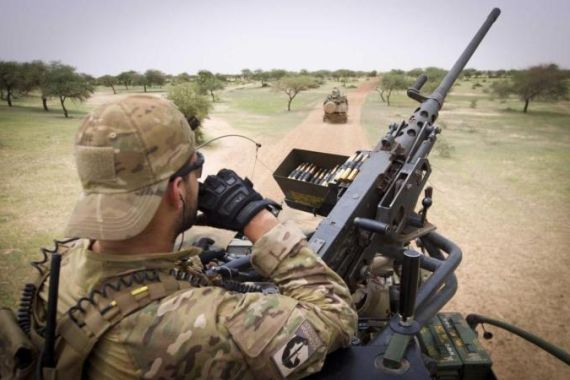UN chief ‘outraged’ by deadly Mali ambush
Security Council and African Union decry Niger peacekeepers’ deaths in attack by suspected al-Qaeda-linked group.

Strong condemnation has greeted the killing of nine UN peacekeepers from Niger by assailants on motorbikes in northeastern Mali.
Ban Ki-moon, the UN secretary-general, said in a statement he was “outraged” by Friday’s attack, which he described as “a serious violation of international law”.
Keep reading
list of 4 items‘Unconscionable’: US sends dozens to Haiti on deportation flight
Ten years after Chibok girls kidnapping: One woman’s struggle to move on
Gunmen kill at least 11 in two attacks in Pakistan’s Balochistan
An officer from Niger with the MINUSMA mission told AFP news agency the ambush had been staged by the Movement for Oneness and Jihad in West Africa (MUJAO), an al-Qaeda-linked group behind numerous attacks in the West African nation.
“This is the deadliest attack against the UN mission in Mali,” a statement from MINUSMA said, adding that aircraft had been deployed to secure the area.
The deaths mark the first losses suffered by Niger’s 600-strong force, deployed to Mali in January last year.
The ambush brought to 30 the number of deaths in the MINUSMA mission since its deployment in July last year.
Mahamadou Issoufou, Niger’s president, pledged to maintain his country’s participation in MINUSMA, saying that security forces from his country “will not step back” from “the fight against terrorism”.
“They will continue to contribute to MINUSMA,” he told local television channel.
Wide condemnation
The UN Security Council echoed Ban’s condemnation, while the African Union’s mission in Mali and the Sahel expressed its “consternation” and denounced the “vile act”.
Britain called it unjustifiable, while France said the perpetrators must be brought to justice.
 |
| MINUSMA took over security duties from African troops in Mali in July last year with a mission to ensure stability in Mali [AP] |
MINUSMA and a senior military official from Niger said the convoy of peacekeepers were on a supply run in the northeastern Menaka-Asongo corridor when they were ambushed by men on motorbikes.
The Niger MINUSMA source said MUJAO had formed an alliance with fighters from the Fulani ethnic group in the Gao region where the attack took place.
“The terrorists had threatened to carry out attacks in the run-up to the feast of Tabaski. They’ve just carried them out,” said a Malian military source, using the West African name for the Islamic festival of Eid al-Adha taking place on Sunday.
The region of Gao is part of a large expanse of desert which is the cradle of a Tuareg separatist movement that wants independence for the homeland it calls “Azawad”, and from which several rebellions have been launched since the 1960s.
About 50 Malian soldiers were killed around Menaka – an isolated Sahara desert town in eastern Mali – and the flashpoint town of Kidal further north by Tuareg and Arab fighters in May.
Ten UN peacekeepers – all from Chad – have been killed by roadside bombs in the Kidal region in recent weeks, prompting the government in N’Djamena to complain to the UN that the Chadian contingent of MINUSMA were suffering discrimination.
Al-Qaeda connection
MUJAO claimed responsibility for a rocket attack on a MINUSMA base close to the border with Algeria in August.
It joined forces with Al-Qaeda in the Islamic Maghreb (AQIM) and Ansar Dine in 2012 to take control of much of the desert north, including the three main towns of Kidal, Gao and Timbuktu.
They seized power on the back of an uprising by ethnic Tuareg separatists and imposed strict Islamic law and punishments for 10 months, before being routed from the towns and forced back into desert hideouts by a French military intervention launched in January 2013.
Though order has largely been restored across the territory, the fighters continue to carry out raids and attacks and French troops are still on patrol.
They were also blamed for a suicide attack on August 16 that killed two soldiers from Burkina Faso serving with MINUSMA in the settlement of Ber, near Timbuktu.
MINUSMA took over security duties from African troops in Mali in July last year, with a mission to ensure stability in Mali.
A 12,600-strong force, made up largely of Africans, replaced the AFISMA military mission, which has been supporting the French intervention.
The mission played a key role in presidential polls which saw Ibrahim Boubacar Keita rise to power in August 2013.